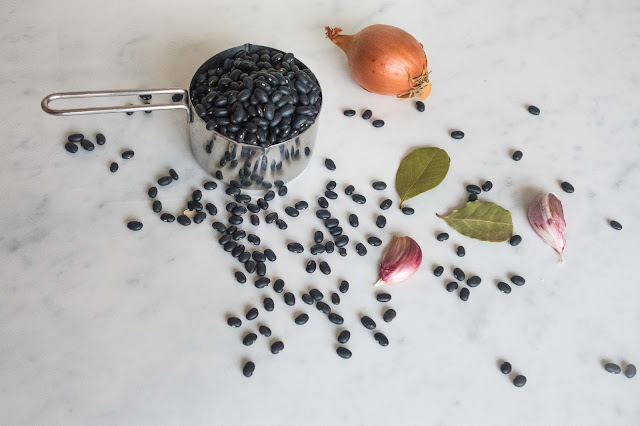Hello everyone!
Hope you all had a great break. Let’s hope for a happy and healthy New Year!
With the festivities over it's time to resume the routine. After the break, it’s good to be back and share my cooking with you. The family who came over for Xmas has returned to Brazil. Since they left I have been craving for one of our biggest staple foods: black beans. It’s not that I don’t cook it here but, when I was growing up, we had black beans served at every lunch and dinner. Somehow, saying goodbye to the family, and remembering my parents who are not amongst us anymore, touched something in me that made me crave for a childhood comfort food.
This dish is a source of iron, fibre, protein, and other vitamins and minerals. To me it is also a source of memories and stories we shared during the meals. Apart from the sentimental side of it, this wholesome dish is soooo good.
Like my friend chef Teresa Corção says: “Food is culture, affection and memory”. Black beans have become trendy in the UK in the past couple of years, especially with vegans. Even fast food chains like Leon now serve “Brazilian” black beans. Nice as they might be, these are not the black beans as Brazilians know it.
I am not a purist, I like to play with flavours and different ingredients. But this post is about going back to basics.
 |
| Main ingredients. |
 |
| Place beans, water and bay leaves in the pressure cooker and cook until soft. |
 |
| My Brazilian black beans served with black rice, okra, roasted carrots and poached egg. |
Classic Brazilian black beans
Ingredients
500g black beans *
2 litres cold water
2 bay leaves
2 Tablespoons extra virgin olive oil
1 medium onion, chopped
3-4 cloves of garlic, chopped
salt and black pepper to taste
Method
Rinse the beans under a cold tap, make sure there aren't any stones or other impurities.
Place them in a bowl, add the cold water and soak for 12 hours or overnight. If any beans float, throw them away. Change the water 2-3 times, preferably.
Once soaked, place water, black beans and bay leaves in a pressure cooker. Close it and bring it to high pressure. When the steam starts to escape, bring the heat down to medium and cook for 10 minutes. If not using a pressure cooker, cook the beans in a normal pan for approximately 40 minutes.
Remove pressure cooker from heat and allow it to release pressure naturally. The beans will be cooked when they are slightly firm outside and soft inside.
In another saucepan, add the olive oil, fry the onions and garlic until they reach a golden colour. Add a couple of ladlefuls of the cooked beans. Mix well then transfer this mixture into the pressure cooker. Season to taste and let it cook on a low heat for another 5 minutes.
If you are not going to season the whole cooked beans now, you can freeze them.
*In Brazil, depending on the region, people eat different types of beans. You can find some of them in the UK, like the most common black and pinto beans, in Brazilian delis around London.
A healthy note: Black beans (Phaseolus vulgaris) are one of the best sources of fibre. Research has shown that the high content of fibre can help lower cholesterol and prevent the quick rise of blood sugar levels after a meal. It makes them especially good for people diagnosed with diabetes, hypoglycaemia or who are insulin resistant. Black beans are also a good source of folic acid, vitamin B6, iron, magnesium, potassium, zinc. Studies have shown that folic acid and B6 help lower elevated levels of homocysteine, preventing heart attack.
Black beans also contain protein. The combination of black beans and rice on your plate makes it a perfect complete protein meal.
Bay leaves (Laurus nobilis) play a very important role in the gastrointestinal tract. The leaves act as a diuretic, decreasing toxicity in the body. Bay leaves have a compound that aids upset stomachs and helps to soothe Irritable Bowel Syndrome. The unique enzymes found in bay leaves ease digestion and nutrient intake.
Till next week!


No comments
Post a Comment